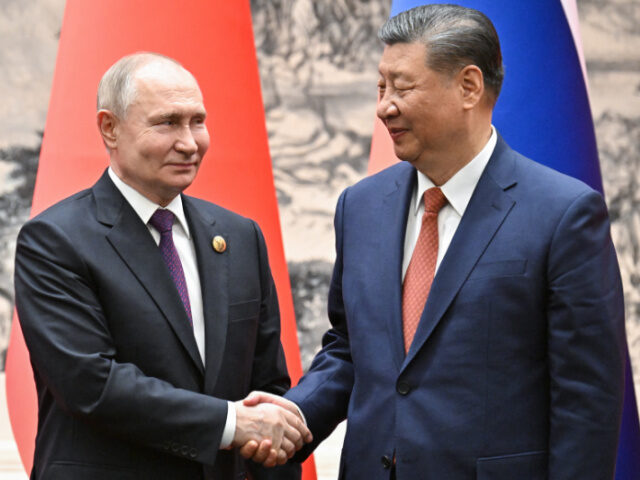The NATO military alliance accused the Chinese communist government of being a “decisive enabler” of its top threat, Russia, and the source of “sustained malicious cyber and hybrid activities” in the declaration following its annual summit this week.
NATO is currently concluding its annual summit, hosted this year by Washington, DC. It published a declaration following extended meetings on Wednesday bringing together the leaders of its members and key nonmember states: South Korea, Australia, New Zealand, and Japan. Also in attendance was Ukrainian President Volodymyr Zelensky, who has for years campaigned to convince NATO to grant his country membership. Zelensky failed once again, though NATO officials insisted Kyiv was on an “irreversible” path to membership and offered millions of dollars in aid to its defenses against the ongoing Russian invasion.
Ukraine was the foremost topic of discussion at the NATO summit, as most nations that make up the alliance are in Europe and have expressed concern that Russian military belligerence would expand deeper into the continent. The NATO declaration, however, also used firm language to condemn communist China – not just for its support of Russia against Ukraine-related sanctions, but for its independently “malicious” behavior against NATO countries and its allies.
The PRC [People’s Republic of China] continues to pose systemic challenges to Euro-Atlantic security,” the declaration read. “We have seen sustained malicious cyber and hybrid activities, including disinformation, stemming from the PRC. We call on the PRC to uphold its commitment to act responsibly in cyberspace.”
“We are concerned by developments in the PRC’s space capabilities and activities. We call on the PRC to support international efforts to promote responsible space behaviour,” the declaration continued. “The PRC continues to rapidly expand and diversify its nuclear arsenal with more warheads and a larger number of sophisticated delivery systems.”
A report published in June by the Stockholm International Peace Research Institute (SIPRI) found that China is rapidly growing the size of its nuclear arsenal, reportedly possessing 500 nuclear warheads, up from 410 in 2023.
NATO also stated that China’s relationship with Russia was a “cause for profound concern” and separately condemned Beijing for becoming a “decisive enabler of Russia’s war against Ukraine.”
“The PRC cannot enable the largest war in Europe in recent history without this negatively impacting its interests and reputation,” the alliance warned, adding that it is “open to constructive engagement” with China in the future, anyway.
NATO has traditionally focused on the threat of the Russian government to its member states but has become increasingly vocal in condemning China, a top geopolitical threat to the United States and Europe. Outgoing NATO Secretary-General Jens Stoltenberg accused China, along with other nations who “do not share our values,” of aiding the Russian invasion of Ukraine and, as a result, threatening NATO in remarks this week.
“Security is global, not regional. Putin’s war is fueled by those who do not share our values,” Stoltenberg said during a press conference this week, reported the Ukrainian state outlet Ukrinform reported. “Iran and North Korea provide direct military support, while China is propping up Russia’s war economy. This is not just a temporary coalition of convenience, it is a major strategic shift. And we must remain clear-eyed as to the threat it poses.”
“In this dangerous world, friends and partners are more important than ever. So today we agreed to continue to strengthen our partnerships, especially in the Indo-Pacific,” Stoltenberg said, referring to talks among NATO leaders on Wednesday.
Stoltenberg similarly suggested in remarks in June that NATO could act against China in response to its support of Russia in the Ukraine war.
“China is fueling the largest armed conflict in Europe since World War II, and, at the same time, it wants to maintain good relations with the West,” he said at the time. “Beijing cannot have it both ways. At some point — and unless China changes course — allies need to impose a cost. There should be consequences.”
Stoltenberg insisted that NATO’s security is “not regional”: “I think there’s this idea that we can distinguish between the threats we see in Europe, posed by Russia, and the threats and the challenges in Asia, Asia Pacific, posed by China, that we can separate those is wrong.”
The Chinese government issued an irate response to the NATO declaration. In remarks to reporters on Thursday, Foreign Ministry spokesman Lin Jian called NATO “unreasonable” and “sinister” for describing China as a global threat.
“China urges NATO to … stop interfering in China’s internal politics and smearing China’s image and not create chaos in the Asia-Pacific after creating turmoil in Europe,” he insisted.
In remarks on Wednesday, Lin similarly anticipated NATO’s concerns about Beijing, stating that the Communist Party leaders “firmly oppose NATO acting beyond its characterization as a regional defensive alliance, inserting itself into the Asia-Pacific to incite confrontation and rivalry, and disrupting the prosperity and stability in this region.”
“We urge NATO to make real contribution to world peace, stability and security,” Lin concluded.
The Global Times, a Chinese government propaganda newspaper, dismissed NATO in a scathing column on Thursday declaring that it “should have disbanded after the Cold War.”
“No matter how hard it tries to present itself as a ‘peacekeeping organization,’ it cannot hide its true nature as a ‘war machine,'” the Times claimed. “NATO’s so-called security comes at the expense of the security of other countries; many of the ‘security anxieties’ peddled by NATO are created by the organization itself.”
NATO countries “pose great danger to the world,” the state outlet continued, and countries “that love peace should remain vigilant against this dangerous trend.”
WATCH — Pelosi: ‘I’ve Said to Everyone’ Hold Off on Biden Decisions Until After NATO Summit

COMMENTS
Please let us know if you're having issues with commenting.